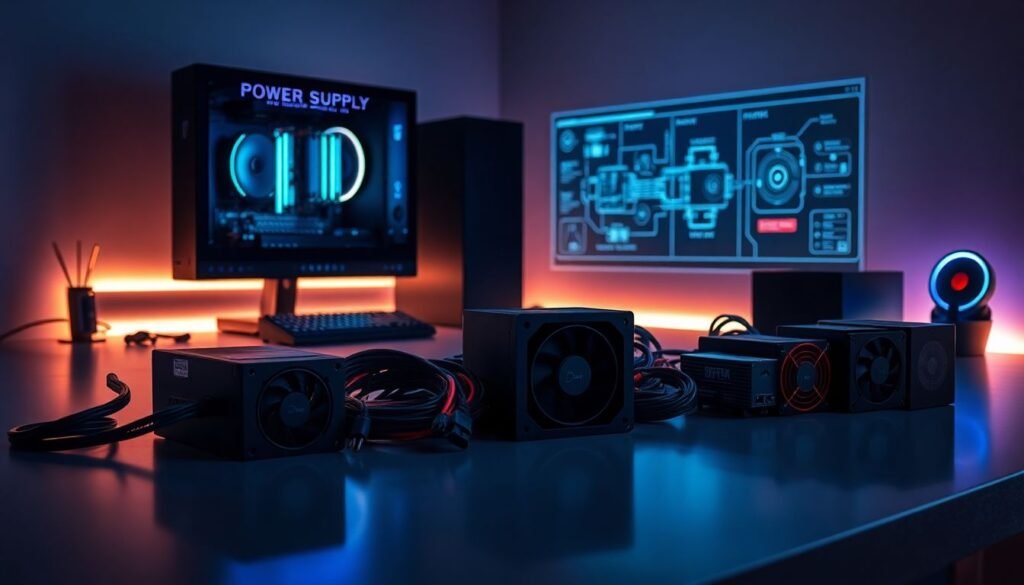
Introduction
A reliable power supply unit (PSU) is the backbone of any stable computer. Without it, your system can crash unexpectedly or wear out faster. Picking the right PSU boosts your PC’s performance, lengthens its lifespan, and keeps hardware safe. Many people make mistakes here, choosing based on price or brand instead of actual needs. This guide helps you pick the perfect power supply that fits your build now and later.
Understanding the Fundamentals of PC Power Supplies
What Is a Power Supply Unit (PSU)?
The PSU turns the energy from your wall outlet into the electricity your parts need. It’s like a translator between your power source and your hardware. Inside, it has small components like transformers, capacitors, and fans that work together to deliver smooth power. Without a good PSU, your system can have glitches or hardware damage.
Why the Right Wattage Matters
Wattage is the amount of power your PC needs to run. Not enough wattage, and your PC may crash or refuse to start. Too much, and you waste money and energy. Choosing the right wattage means your PC runs smoothly now and can handle updates later. It’s like shopping for shoes: too tight or too loose will cause trouble.
Efficiency Ratings and Certification Standards
PSUs have efficiency ratings marked by the 80 Plus certification. Levels include Bronze, Silver, Gold, Platinum, and Titanium. Higher efficiency means less energy lost as heat. This saves on bills and keeps your PC cooler. An 80 Plus Gold or better is ideal for demanding setups, especially where long-term savings matter.
Assessing Your Power Needs
Calculating Your System’s Power Consumption
Start by listing all your components: CPU, GPU, RAM, drives, and fans. Use online calculators like OuterVision or PCPartPicker to estimate wattage. For example, a gaming rig might need 500-650W, while a basic office PC could run fine on 300W. Always check the max power draw of high-power parts.
Considering Future Upgrades
Think ahead. Will you add a more powerful GPU or extra storage? Planning for upgrades prevents needing a new PSU sooner. Choose a PSU with room to grow. If your current setup needs 500W, pick a 600-650W power supply to handle future hardware.
Identifying Peak Power and Continuous Power
Peak power is what your PSU can temporarily handle, but not always sustain. Continuous power is the consistent wattage a PSU provides. For safety, buy a PSU that offers at least 20% more wattage than your system needs. This buffer ensures stable performance during heavy loads.
Key Factors in Selecting a High-Quality Power Supply
Wattage and Headroom
Pick a wattage that matches your system’s current needs but leaves room for upgrades. For most gaming or work PCs, 550-750W is enough. Always add about 20% extra capacity; it keeps everything running smoothly. For example, if your build draws 400W, a 480-500W PSU is a good choice.
Efficiency Ratings and Eco-Friendliness
A highly efficient PSU reduces electricity bills and heat. An 80 Plus Gold or higher model is worth the investment—especially for power hitters. It burns less power and lasts longer. You’ll notice savings over time and a cooler, quieter system.
Modular vs. Non-Modular PSUs
Modular PSUs let you connect only the cables you need. This makes cable management cleaner and airflow better. Non-modular units have fixed cables, which can cause clutter. If you want a tidy build, go modular. Budget builds might opt for non-modular options to save money.
Protection Features and Reliability
Good PSUs have safeguards like over-voltage, under-voltage, short-circuit, and overcurrent protection. These keep your hardware safe from electrical issues. Reliable protection means your components live longer and perform better.
Brand Reputation and Warranty
Choose brands known for quality, like Corsair, Seasonic, EVGA, and be quiet!. Check warranty periods—many top brands offer 5-10 years. Longer warranties show confidence in the product and protect your investment.
Additional Tips for Choosing the Best Power Supply
Compatibility and Form Factor
Make sure your PSU fits your case, whether it’s standard ATX or smaller SFX. Confirm that your motherboard and components connect correctly. A mismatch causes delays and frustration.
Noise Levels and Fan Quality
If your PC is close by or in a quiet environment, noise matters. Look for PSUs with quiet fans or semi-passive modes that turn off the fan at low loads. Better cooling fans last longer and operate more quietly.
Price Range and Value for Money
Balance your budget with quality. Sometimes, spending a bit more on a top-tier PSU saves money in the long run. But don’t overspend on features you don’t need. Focus on getting a reliable, efficient model that matches your needs.
Real-World Examples and Case Studies
Popular builds show that a mid-range gaming PC often needs a 650W, 80 Plus Gold PSU from trusted brands. Users report fewer crashes and less heat with high-quality PSUs. Failures usually happen from cheap or mismatched units—proof that quality matters. Reading user reviews and expert tests can guide your choice.
Conclusion
Picking the right power supply is essential for a stable and long-lasting PC. Balance wattage, efficiency, and quality with future upgrades in mind. Always choose trusted brands and aim for at least 80 Plus Gold certification. Plan your system’s power needs carefully, and you’ll enjoy a smooth, reliable experience for years. Invest wisely—your PC’s health depends on it.